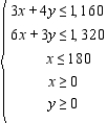Kane Manufacturing has a division that produces two models of grates, model A and model B. To produce each model A grate requires 3 pounds of cast iron and 6 minutes of labor. To produce each model B grate requires 4 pounds of cast iron and 3 minutes of labor. The profit for each model A grate is $2.00, and the profit for each model B grate is $1.50. Available for grate production each day are 1,160 pounds of cast iron and 22 labor-hours. Because of an excess inventory of model A grates, management has decided to limit the production of model A grates to no more than 180 grates per day.
Let x denote the number of model A grates and y the number of model B grates produced. Then, the problem can be reduced to a linear programming problem with the objective function P = 2x + 1.5y and constraints

Find the range of values that resource 2 (the constant on the right-hand side of constraint 2) can assume.
≤ C resourse2 ≤
By how much can the right-hand side of constraint 3 be decreased so that the current optimal solution still holds?
It cannot be decreased by more than __________ units.
Correct Answer:
Verified
Q204: You are given a linear programming problem.
Q205: Kane Manufacturing has a division that produces
Q206: You are given a linear programming problem.
Q207: You are given a linear programming problem.
Q208: Deluxe River Cruises operates a fleet of
Q209: You are given a linear programming problem.Use
Q210: You are given a linear programming problem.
Q211: Deluxe River Cruises operates a fleet of
Q212: Ace Novelty wishes to produce two types
Q213: You are given a linear programming problem.
Unlock this Answer For Free Now!
View this answer and more for free by performing one of the following actions

Scan the QR code to install the App and get 2 free unlocks

Unlock quizzes for free by uploading documents